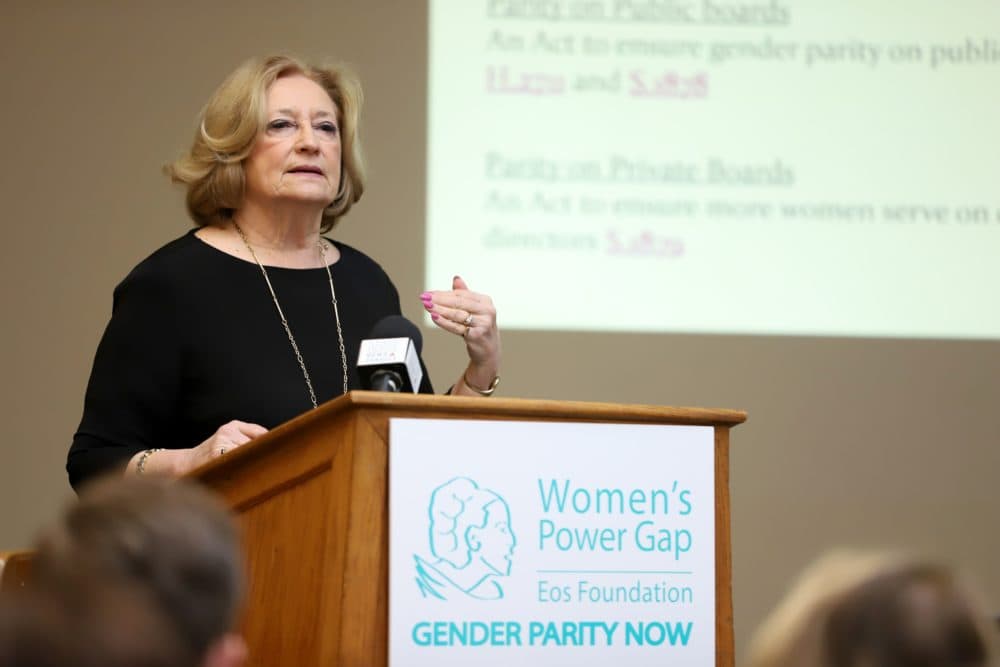Advertisement
Legislation Eyed To Force Gender Parity On State Boards

Legislators and advocates called Tuesday for gender parity on public boards and commissions, and Speaker Pro Tempore Patricia Haddad said legislators have a "strong obligation" to improve the situation.
Haddad and Sen. Jason Lewis spoke at an event with the Eos Foundation, which released a report about the gender representation on 50 public boards and commissions. Lewis and Haddad have sponsored an act to ensure gender parity on public boards and commissions.
"It has to be that there is a decision made every day when you get up in the morning, to make sure that you promote women," Haddad said. "And you promote women of color, you promote different ethnicities and you promote differences in people because they enrich us."
Starting on Jan. 1, 2022, legislation pending on Beacon Hill would require that all appointed public boards and commissions have at least 50 percent women board members or commissioners, and when "practicable" will reflect the racial and ethnic composition of the general population.
"Diversity in our state's workforce and particularly in our leadership, in both the public sector and the private sector, I think is critically important," Lewis said. "It's critically important, first of all, because it's the right thing to do. And it's critically important as an economic imperative for the state of Massachusetts."
The bill also calls for the state commission against discrimination to collect demographic data on all boards and release that information annually.
Beth Chandler, president and CEO of YWCA Boston, announced plans to form a coalition of groups to advocate for the legislation, and said the group would work to include women of color in gender parity discussions.
"In addition to promoting gender equity, it is also important to ensure that women of color are included," Chandler said. "Efforts to increase gender equity aren't always intentional about ensuring that the needs of women of color are addressed as well."
Also discussed at the meeting was a bill to increase representation on private boards. It would require that by the end of 2021, all publicly held corporations with principal executive offices in Massachusetts have at least one female director on its boards, and by the end of 2023, depending on the size of the board it must have two or three women. If violated, companies may be fined up to $100,000.
The report on public boards, part of the Eos Foundations "Diversity Snapshot" and women's power gap initiative, found that only 32 percent of public boards have reached gender parity and over half have less than 40 percent women board members.
The study found that people of color have even less representation, with only 4 percent of board chairs are men of color and 6 percent are women of color. Including that 6 percent, 34 percent of board chairs are women.
Of the public boards that have CEOs, 22 percent are women, 5 percent are men of color and 2 percent are women of color.
Andrea Silbert, Eos Foundation president, said women tend to be on boards where the sectors are traditionally female and women are rare on many business and technology boards. Massventures, Clean Technology Center, Massachusetts Life Sciences Center and the Growth Capital Corporation have less than 30 percent female members.
Women are also underrepresented on education boards, despite the fact that women make up 75 percent of K-12 teachers, 94 percent of child care workers and 57 percent of all higher education students. Meanwhile women make up 18 percent of the non-student members of the Board of Higher Education and 36 percent of the Board of Elementary and Secondary Education. In addition, the commissioners for the Board of Early Education and Care, Elementary and Secondary Education and Board of Higher Education are all men.
"We've really got to be intentional," Silbert said. "We've literally got to curate those boards to make sure they are diverse."
The report ends with recommendations to improve the representation on the boards, including publishing data on the boards every year, making sure groups that appoint board members coordinate this effort and making sure the governor chooses more diverse candidates to serve as board chairs.
"These commissions are coming up with policies that impact our whole state," Silbert said. "They contribute to the business tax, economic development and as Beth said without different perspectives we are going to get wrong policies. Not just policies that are ineffective, but policies that actually could send us in the wrong direction."